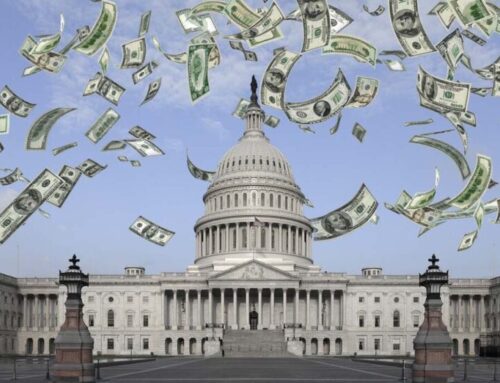Well, that was a week to remember. Nearly $5 trillion of authorized spending, if you look at the advertised sticker price. And $1.2 trillion of it endorsed on a bipartisan basis. In our quarter-century of existence, we’ve never seen the Senate approve so much spending in just a few days. Taxpayers hoping for a bipartisan revival of fiscal responsibility should be concerned. But mainly for the potential bipartisan crisis lurking in the shadows.
First, a point of order. The money isn’t gone. The big bipartisan infrastructure framework (BIF) – officially titled the Infrastructure Investment and Jobs Act – has gone over to the House side of the Capitol for consideration. And after a relatively unprecedented Senate session creeping well into August, Speaker Pelosi (D-CA) has announced the House will be back in session August 22nd. The infrastructure train is moving, but not yet at its destination.
But the BIF is not all or even the primary legislative vehicle on the Speaker’s mind, nor the most expensive. There’s also the budget resolution with $3.5 trillion in reconciliation instructions that the Senate passed immediately after the infrastructure vote.
The bigger – huger – reconciliation package will take a few months before a final vote, and therein is the rub. Which goes first?
But before we get into that, let’s talk a bit about the infrastructure package. Yes, recently there was extensive bipartisan support for several COVID-19 relief deals, but it has been a long time since a legislative package like this has garnered such significant bipartisan support. Bills directed at crises deemed an emergency at the time typically attract bipartisan support. Bills significantly expanding government programs for “routine” investments, not so much. The Infrastructure Investment and Jobs Act is more than half a trillion dollars in new spending on top of modifying highway, transit, and water infrastructure spending already slated. It is a big deal.
It’s also important to point out that the Bipartisan part of BIF is big too. Just to be clear, we have troubles with some of the pay-fors, the price tag, and some of the projects. But let’s set that aside for a moment. Nineteen members of the minority party joined with all members of the majority to pass this package. That is a bigger deal than a 93-7 vote or a 53-47. Votes are easy when all but a couple are with you or when it’s all of your party and a couple of hangers on, but with that that vote, whether we like the bill or not, it is significant. The vote shows a real desire to increase investment in various forms of infrastructure across the country and across the aisle.
The bipartisanship, in this case, is also an affliction. Senators have united in their desire to increase spending without any prioritization. Backers of the BIF claim their bill is paid for and pour cold water on the Congressional Budget Office (CBO) analysis stating the bill will add $256 billion to the 10-year deficit. But it could actually be worse. Some of the offsets are speculative or specious including unspent COVID relief funds, sales of wireless spectrum, and economic returns from dynamic scoring, to name a few. We’re a budget watchdog, and we’ll stay in our lane. We’re not pushing some Kumbaya message or that everyone should work together all the time. We have a point of view, and there is plenty we support or oppose from one side or the other, but to have durable policy success, you need to have buy-in from both parties. Big challenges are facing the nation - not just the current pandemic, but the spiraling debt, needed reforms to shore up Social Security and Medicare, tackling climate change, to name just a few. This country needs some bipartisan success. The BIF, warts and all, plants the seed.
Yet, the reconciliation package may not bear bipartisan fruit. Right now, the House is facing a chicken and egg moment. Which bill should be tackled first? The BIF bill passed with all 50 Senate Democrats from the most progressive to the most conservative. But the House is loath to pass it if the far bigger reconciliation package doesn’t get enacted. And that won’t be ready on August 22nd. Believe it or not, it takes a while to figure out how to spend $3.5 trillion. Committees across Congress have been instructed to find new things on which to spend these “infrastructure” funds. We say “infrastructure” because this is supposed to be human infrastructure. There is a lot that may be in this bill – everything from subsidized preschool to more agriculture supports for farmers.
In short, we have our work cut out for us. Stay tuned in the coming weeks for more on the behemoth budget reconciliation package and its path through Congress. So much for a restful August recess this year… But your taxpayer dollars – all $5 trillion of them – are important so we will be hard at work steering them in the right direction.











Get Social